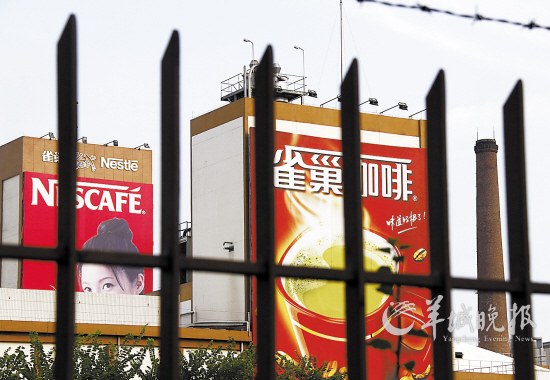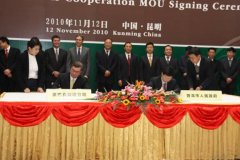Dongguan Nestle Coffee Factory Exhaust Gas Disturbing People

In Dongguan Nancheng Nestle factory near many residents complain: Don't think coffee smells fragrant, smell for a long time that is a kind of suffering! Nestle factories generally concentrate on exhaust gas before 10 a.m. and after 7 p.m., when white or even yellow smoke can be clearly seen, the smell of coffee coke is also the strongest, and the windows dare not open.
Public complaints:
It's a torture to smell it for a long time
As the first Fortune 500 company to settle in Dongguan, Nestle Co., Ltd. bought tens of thousands of square meters of wasteland in Nancheng, Dongguan in 1988. With urbanization, the factory is now surrounded by shops, office buildings and several large residential buildings.
A few days ago, the reporter took a bus to Guantai Road Bank of China Dongguan city branch, although there are still a few kilometers away from Nestle factory, has been able to smell a coffee smell. Nancheng Pedestrian Street, near the company, has a stronger coffee flavor. The reporter originally intended to enter the factory for an interview, but was told by the guard: "We are only a production workshop here. If you want to know the situation, you have to contact the headquarters."
"City scenery" community is close to Nestle factory, owner Liu Junsheng told reporters: "I used to like coffee very much, but after living here, smell that coffee smell every day, now a mention of" coffee "word is disgusting."
"Crystal City" district and Nestle factory straight line distance of no more than two kilometers, Chen Min recently is planning to entrust intermediary companies to sell houses,"Wen long that is a kind of suffering!" I've lived here for two years, and the furniture and floors are often covered with soot, and visitors say they're dizzy from coffee." Chen Min also said that since 2009, residents of the community have complained to the Environmental Protection Bureau of Dongguan city many times, but no results have been achieved.
Environmental Protection Department:
It's not "stink." It's "smell."
For repeated complaints from citizens, Dongguan city environmental protection bureau also feel very helpless. The bureau said that the "coffee smell" smelled by residents around Nestle factory should be "coffee odor", and its main odor is a variety of aromatic substances emitted after roasting, mainly furans, phenols and olefins. The smell is not acceptable to all people, and when exposed to the smell for a long time, some people will think it is an odor, or even a "smell." However, in the relevant national environmental protection technical specifications, relevant monitoring technical specifications and relevant standards have not been formulated for food gases, so the environmental protection department has no monitoring basis and monitoring standard method to monitor and evaluate such coffee odor.
"The Nestle plant has a heating and baking process and the fuel is natural gas. According to the relevant management measures, we will carry out quarterly routine monitoring of wastewater generated by the company's cleaning process and exhaust gas generated by the baking furnace. The exhaust gas monitoring indicators are particulate matter, sulfur dioxide, nitrogen oxides and smoke color." Dongguan city environmental monitoring station responsible person said, Since last year, Nestle Dongguan factory monitoring reports have shown that its gas emissions four indicators are up to standard.
Expert opinion:
Companies need to manage odors
" At present, our country's regulations on odors only have the Emission Standard for Odor Pollutants, which stipulates the emission standards for eight kinds of odorous pollutants and odor concentration." Chen Zunyu, professor of School of Environmental Science and Engineering of Sun Yat-sen University, said that although the specific substances producing coffee odor are not necessarily in the range of eight kinds of odor pollutants, as long as they have adverse effects on people's lives, they can be regarded as odor pollution. According to the standard, the odor concentration of the factory can be measured to judge whether the odor of the factory exceeds the standard. Upon receipt of a complaint, the environmental protection department can handle it in accordance with relevant legal requirements.
Chen Zunyu also said that many industries are currently facing odor pollution problems. "First of all, the enterprise itself should pay attention to the management and treatment of odors, seal the processes that may produce odors, collect gases and carry out centralized treatment, etc., and the environmental protection department should also regularly supervise key enterprises." However, fundamentally speaking, it is still a matter of the concept of the enterprise, which not only ensures the safety of employees and surrounding residents, but also improves the production efficiency and the connotation of products, thus achieving a win-win situation between the enterprise and the environment."
Company response:
Take measures to reduce environmental impact
Nestle is not unaware of the complaints from residents. The company replied to Yangcheng Evening News reporter: "Nestle Dongguan factory is a very special situation. The factory was built on a wasteland, but with the acceleration of urbanization, the factory was surrounded by cities. This situation brings difficulties not only to the surrounding residents, but also to the factory. We are aware of complaints in this regard and have taken proactive measures to address them. For example, since 2007, Nestle Coffee Factory has invested nearly 10 million yuan to reburn the smoke generated during the roasting process and install a burner after coffee roasting to reduce odor emissions."
When asked if Nestle Dongguan would move away from Nancheng, the company did not give a positive answer, saying only that "various measures will be actively taken to reduce the impact on the surrounding environment."
China Coffee Trading Network: www.gafei.com
Important Notice :
前街咖啡 FrontStreet Coffee has moved to new addredd:
FrontStreet Coffee Address: 315,Donghua East Road,GuangZhou
Tel:020 38364473
- Prev

The first large-scale coffee planting base appeared in Guangdong
According to the China News Service, the trial planting of coffee trees in Guangdong was successful in Zhenan Town, Yunan County, Yunfu City.
- Next

Starbucks Coffee Company and Pu'er Municipal Government join hands with Coffee Industry
Starbucks Coffee Company and Pu'er Municipal Government join hands in Coffee Industry on November 12, 2010, Starbucks Coffee Company signed memorandums of understanding with the Yunnan Academy of Agricultural Sciences and the people's Government of Pu'er City, respectively. It marks the milestone of Pu'er City and Starbucks Coffee Company, and also marks the beginning of Pu'er coffee industry towards large-scale, intensive, standardized, export-oriented, brand.
Related
- Unexpected! Ruixing Telunsu lattes use a smoothie machine to foam milk?!
- % Arabia's first store in Henan opens into the village?! Netizen: Thought it was P's
- Does an authentic standard mocha coffee recipe use chocolate sauce or powder? Mocha Latte/Dirty Coffee/Salty Mocha Coffee Recipe Share!
- What is the difference between Vietnam egg coffee and Norway egg coffee? Hand-brewed single product coffee filter paper filter cloth filter flat solution!
- What is the difference between sun-cured and honey-treated coffee? What are the differences in the flavor characteristics of sun-honey coffee?
- How to make Italian latte! How much milk does a standard latte use/what should the ratio of coffee to milk be?
- How to make butter American/butter latte/butter Dirty coffee? Is hand-brewed coffee good with butter?
- Is Dirty the cold version of Australian White? What is the difference between dirty coffee/decent coffee and Australian white espresso?
- Relationship between brewing time and coffee extraction parameters How to make the brewing time fall to 2 minutes?
- Got entangled?! Lucky opens a new store, Mixue Ice City, and pursues it as a neighbor!

